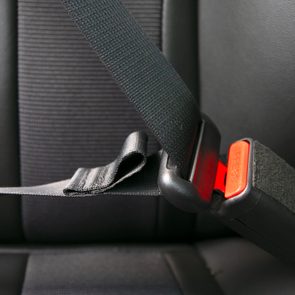I’m not a big honker (not that kind of honker, excuse you), but I’ll tap my horn when someone turns illegally or stares at their phone through an entire green light. Or—and this happened to me just this morning—when a kid on an e-bike is cruising down the middle of the street in the dark, helmet-free, like he’s got a steel skull. Admittedly, I don’t know the proper driving etiquette in these situations. Is a single honk OK but a series of 10 toots poor form? Is lying on the horn for a full minute a driving faux pas? And for that matter, can your car run out of “honk” if you’re a little too horn-happy?
It sounds like the kind of question a 5-year-old asks on a long road trip, right up there with “Are we there yet?” But plenty of grown adults wonder about this too. I started really pondering it after a car alarm went off at 2 a.m. and honked nonstop for what felt like an eternity. (OK, it was probably 30 seconds, but time moves differently when you’re listening to an uninterrupted honk in the middle of the night.) Surely car horns have limits.
To settle this once and for all, I reached out to Chris Pyle, an auto expert with JustAnswer and a certified mechanic with over 30 years of experience, and Tim Rodifer, a mechanic and the technical director at Mr. Transmission–Milex Complete Auto Care. Read on to find out whether it’s possible to use your horn too much and if your car can actually run out of honk.
Get Reader’s Digest’s Read Up newsletter for more knowledge, humor, travel, tech and fun facts all week long.
How does a horn work, exactly?
A car horn uses an electromagnetic process that’s a lot more technical than you might imagine. (Nope, it’s nothing like the classic squeeze-bulb horn you secured to your bicycle.) Get this: When you press your steering wheel, you’re not actually creating the sound yourself.
Before we dive into whether your car can run out of honk, let’s talk about how car horns work at the most basic level. “When you press the center of the steering wheel, that closes two electrical contacts that send a signal to the horn relay,” says Pyle. “This energizes the relay and sends power to the horn.”
How? For something so simple, it has some very technical engineering. Inside your horn is a coil that creates a magnet, which pulls a metal plunger attached to a diaphragm. “When the plunger gets too far back, it trips a switch, allowing the coil to release the plunger,” Pyle explains. “This occurs very rapidly, resulting in the diaphragm moving back and forth so fast that it creates an audible tone as it moves air. It is very similar to how a speaker works.”
The diaphragm vibrates hundreds of times per second, creating that distinctive honking sound we all know and love (or hate, depending on which side of the horn you’re on). It’s a little tricky to visualize, but once you see how a car horn works, it makes much more sense.
So can your car run out of honk?

Here’s the answer you’ve been waiting for: technically, yes, but it’s not quite as simple as “running out” of something. Your car can’t run out of honk the way it runs out of gas or windshield wiper fluid. Instead, the horn can stop working if you use it excessively, but it’s due to heat damage, not depletion.
Rodifer puts it this way: “Technically, yes, a car horn can stop working if you hold it down long enough, but that’s not something most people would ever see in normal driving.”
The key word here is normal. (And as we all know, there are far too many abnormal drivers on the road!) But unless you’re trying to set a world record for longest horn honk or you’re stuck in a road rage spiral, you’re not going to experience this problem. Pyle notes that in his three decades of working on cars, he’s replaced only about 12 car horns total—and most of those failures weren’t from overuse.
For how long can a car horn honk?
So let’s say you’re in a car accident, and your steering wheel gets pressed in a way that makes the horn go off continuously. Will it honk forever, or is there a limit?
There’s definitely a limit, but it depends. Rodifer actually tested it out for us! He went to a junkyard and “messed around with old horns and held them down just to see what they’d do,” he says. “Most would last a few minutes before fading out or stop working entirely, usually from the diaphragm overheating or the relay sticking open or melting out.”
Of course, those are old, broken-down cars. Pyle estimates that in newer cars, “after about 15 minutes, it would self-destruct or blow the fuse from excessive amp draw.” (Yes, just 15 minutes! I swear car alarms go on for longer than that, but admittedly, they aren’t continuously honking. Thank heavens for small blessings.)
Here’s what’s happening during those minutes of nonstop honking: “If you keep the horn button pressed for several minutes, things inside start heating up,” Rodifer says. “The diaphragm is vibrating hundreds of times per second, and that constant movement, along with the electrical current, does create heat. Eventually, that heat can build up enough to make the horn fade out or stop altogether until it cools back down.”
So if you’re ever wondering why that car horn at the accident scene eventually stopped blaring—now you know. It literally gave up from exhaustion.
What causes a car horn to break?
Beyond cooking your horn with excessive use, what else can cause it to fail? As it turns out, the horn itself is usually the culprit when things go wrong. “Rarely is it the failure of the fuse, wiring, horn button, switch, contact below the airbag or clockspring,” Pyle notes. “It is the horn itself that fails.”
When horns break, it’s often because “if you use the horn too long, it will get too hot and internally fall apart,” he says.
But heat from overuse isn’t the only issue. Like any car part, horns can fail with age, corrosion or moisture damage. That diaphragm is delicate, and over time, it can deteriorate. The electrical connections can also corrode, especially if you live in an area with harsh winters where road salt is common.
What should you do if your car horn stops working?

First things first: Don’t panic. A nonworking horn is inconvenient, but it’s not an emergency like, say, your brakes failing. However, you should get it fixed relatively soon (more on why in a minute).
Thankfully, fixing a horn is usually pretty straightforward. “If the horn fails, and it’s just the horn itself, you just need to unplug it, unbolt it and replace it,” Pyle says.
A mechanic can typically tackle this job in less than an hour, and the part itself isn’t expensive—usually between $20 and $50 for a standard horn. If you’re handy with cars, you can even fix this car problem yourself. Just locate the horn (usually behind the front grille), disconnect the wiring, unbolt the old horn and bolt in the new one.
Of course, if the problem isn’t the horn itself but rather the wiring, relay or steering wheel switch, things get a bit more complicated. In those cases (or if you’re just not sure), it’s best to let a professional diagnose the issue, he says.
Can a car horn drain the battery?
Yes, but you’d really have to work at it. A car horn does draw power from your battery, but it’s a relatively small electrical load compared with, say, your car’s headlights or climate-control system.
If you honked your horn continuously (which, again, would last about 15 minutes before the horn failed), it could theoretically drain a battery over time, especially if your car wasn’t running. But in normal use—even if you’re a chronic honker who loves to express their feelings at every traffic light—your horn isn’t going to be the reason your battery dies.
The bigger risk is that prolonged honking will kill the horn itself long before it makes a dent in your battery level.
Is it illegal if your horn doesn’t work?
This one depends on where you live, but in most places, yes, having a nonfunctional horn can technically be illegal. Most states require vehicles to have a working horn as part of their basic safety equipment.
That said, you’re unlikely to get pulled over specifically because a cop heard your horn not working. However, if you are pulled over for another reason or are going through a vehicle inspection, a broken horn could result in a citation or a failed inspection.
Beyond the legal aspect, there’s the safety issue. Your horn is an important safety device that can help you avoid accidents by alerting other drivers to your presence. It’s worth keeping it in working order.
When should (or shouldn’t) you use your car horn?
This is the eternal question of driving etiquette. When it comes to horn use, there’s a fine line between helpful communication and aggressive behavior.
You should use your horn to alert other drivers of potential danger or your presence. Think: someone’s about to back into you in a parking lot, a car is drifting into your lane or you’re approaching a blind corner on a narrow road. A quick, polite tap is also acceptable when someone doesn’t notice the traffic light has turned green.
Your horn should not be used to express anger or frustration, or to punish other drivers for their mistakes. That sustained blast because someone cut you off? Not only is it rude, but in some places, excessive horn use can actually get you a ticket. Many cities have ordinances against unnecessary honking, especially in residential areas.
Here’s a good rule of thumb: If your horn honk wouldn’t prevent an accident or alert someone to something they need to know, it’s probably not necessary. Save your honk for when it actually matters—your horn (and your fellow drivers) will thank you.
About the experts
|
Why trust us
At Reader’s Digest, we’re committed to producing high-quality content by writers with expertise and experience in their field in consultation with relevant, qualified experts. We rely on reputable primary sources, including government and professional organizations and academic institutions as well as our writers’ personal experiences where appropriate. For this piece on whether your car can run out of honk, we verified all facts and data, backed them with credible sourcing and will revisit them over time to ensure they remain accurate and up to date. Read more about our team, our contributors and our editorial policies.
Sources:
- Chris Pyle, certified mechanic and auto expert with JustAnswer; phone interview, Oct. 15, 2025
- Tim Rodifer, technical director at Mr. Transmission–Milex Complete Auto Care; phone interview, Oct. 14, 2025
- TA Automotive Technology: “How Car Horns Work”
The post Here’s Whether Your Car Can Ever Run Out of “Honk” appeared first on Reader's Digest.
from Reader's Digest https://ift.tt/cCRIoFu



Comments
Post a Comment